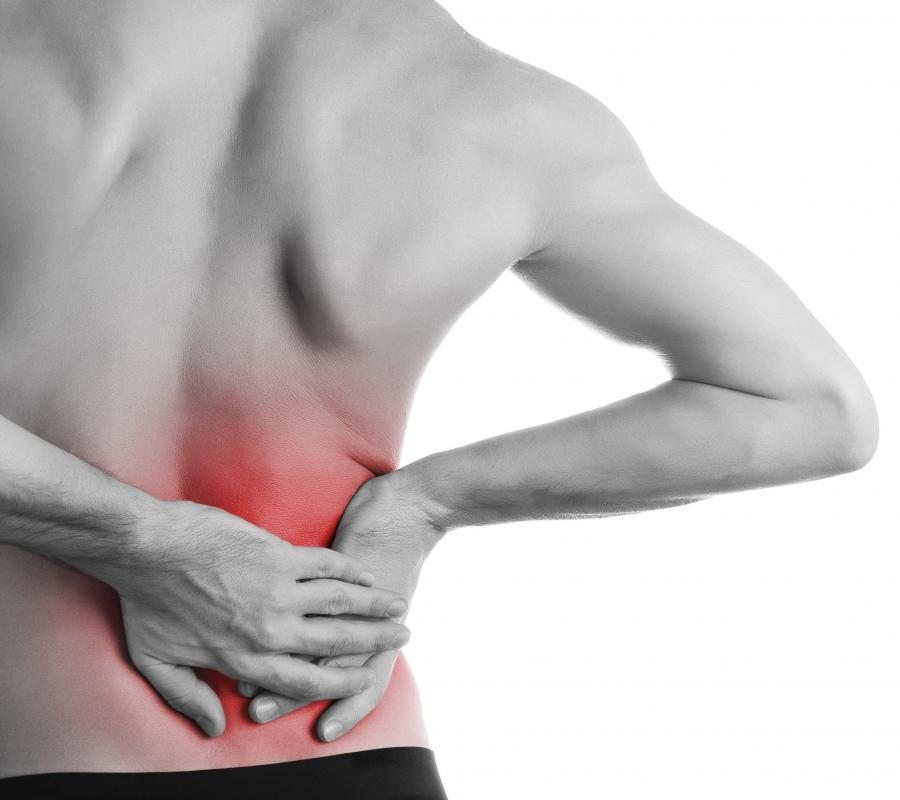At WiseGEEK, we're committed to delivering accurate, trustworthy information. Our expert-authored content is rigorously fact-checked and sourced from credible authorities. Discover how we uphold the highest standards in providing you with reliable knowledge.
What are the Most Common Symptoms of a Pinched Nerve?
The symptoms of a pinched nerve, also sometimes referred to as radiculopathy, may include tingling, radiating pain, burning pain, numbness, or a decrease in sensation affecting a specific body part, such as the back, neck, legs, feet, or arms. Paresthesia, or the feeling of pins and needles prickling beneath the skin, is also a common symptom. Occasionally, it may cause twitching muscles or muscle weakness. One of the most commonly reported symptoms, however, is a sensation that a limb has fallen asleep.
When a nerve is pressed by something like a herniated disk, a bone, or a tendon, it can cause problems in the part of the body that the nerve serves. Often, this is caused by an underlying condition that has caused pressure on the nerve, such as carpal tunnel syndrome, a back injury, or arthritis. Although compression most commonly occurs in the back and the neck, any nerve in the body can become pinched.

The symptoms of a pinched nerve may come and go throughout the course of a day or may depend on the activity a person is doing In some individuals, symptoms are always present, but only worsen during particular activities. As a disorder, radiculopathy is commonly divided into two types: lumbar and cervical. Lumbar radiculopathy refers specifically to symptoms in the lower back, while cervical radiculopathy refers to problem in the neck.

A pinched nerve in the lower back will produce numbness, paresthesia, pain, and muscle spasms. It may also produce a radiating pain beginning in the back and extending down the length of one or both legs. In some people, the nerve may become further aggravated when actions like laughing or sneezing place additional pressure on the abdomen.
An affected nerve in the neck will produce similar symptoms, but the pain will be relegated more to the neck and shoulder area. Often, the symptoms are relieved by over-the-counter creams and ointments, which provide temporary relief from pain, or from prescribed medications. In severe cases, however, surgery may be necessary to relieve the pressure.

Other problems can also be triggered by a pinched nerve, including a loss of sleep, irritability, and depression. Each of these is related to the pain and discomfort originally produced by the nerve problem, which often leads to impaired mobility and emotional disturbances.
AS FEATURED ON:
AS FEATURED ON:

















Discussion Comments
I have a pinched nerve on the right side of my neck (again) which causes pain to radiate down my back, along my right shoulder, down my right arm, hand, and fingers. It's now also causing terrible headaches and nausea, like a migraine.
I'm allergic to Neurontin, so no nerve pain relief. I've had very mixed success with epidural injections, and PT makes me feel worse.
Any ideas about how to keep this from interfering with my life? I'm a singer and dancer, and if I move the pain is excruciating.
I am having pain down below the neck extending to the right shoulders, arms and fingers. Numbness around the fingers, stiffness in the arms, nausea feeling and headaches.
The brain transmits and interprets different sensations from all throughout the body. It is like a massive bundle of nerve cells, neurons, and synapses, which all interact to produce a reception and a response to issues in the body.
The nervous system is a vast interconnected web of "data" in terms of positive and negative signals which vary in magnitude. Pain is negative signals which cause us to react to an area and avoid things which are damaging to our body. A pinched nerve is an example of pain which doesn't directly correlate with bodily damage, but usually only to direct damage of the nerve itself.
Post your comments